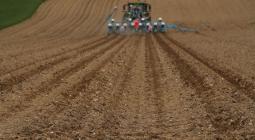Nature-Based Solutions Can Save the Planet, but Only if We Change Our Diets

Natural ecosystems, such as forests, grasslands and oceans, do a pretty good job of storing carbon and supporting biodiversity.
It's therefore no surprise that Nature-based Solutions (NbS) – actions to protect, sustainably manage and restore natural or modified ecosystems, for the benefit of people and nature – are being widely discussed by NGOs, multi-stakeholder platforms and coalitions of countries as "win-win" solutions to the climate and biodiversity crises. But implementing NbS alone is not enough. Their success or failure ultimately depends on the extent to which the world transitions to healthier, more sustainable planet-based diets.
The connection between NbS and dietary patterns comes down to land. Land-use has generally been considered a local environmental issue, but it is becoming a force of global importance and may be the single most pressing environmental issue of our day. Nature-positive farming methods are often promoted as a way to feed humanity while reducing the environmental impact of food production. This includes sequestering more carbon in the soils and above-ground biomass such as trees, supporting biodiversity through wildlife corridors or riparian buffers, and reducing inputs such as nitrogen or pesticides. Yet even these types of NbS will drive an increase in demand for land if trends in food consumption patterns continue.
Food for Thought
The OECD-FAO Agricultural Outlook estimates that rising national GDPs will drive an increase in global meat consumption of 12% by 2030, with continued growth until 2050. Such increased demand would nearly double food-related greenhouse gas emissions and preclude any chance of keeping the global temperature increase to no more than 1.5 degrees Celsius. This increase in demand for meat will also continue to drive deforestation in the tropics, with devastating consequences for biodiversity.
We also need land to plant trees – and we need to plant lots of them. Tree planting has been promoted as another important NbS because trees can absorb and store greenhouse gases from the atmosphere, which is critical in our fight against climate change. In several studies, reforestation is offered as the most promising solution for storing carbon, including the potential to store up to 200 gigatonnes (Gt) of carbon – two-thirds of all the carbon released into the atmosphere since the Industrial Revolution – but only if a trillion trees are planted. This sounds great; however, feeding 10 billion people by 2050 requires that we figure out where we can expand the land needed to sequester carbon and reverse biodiversity loss, while guaranteeing food security.
Despite the global call for reforestation, we continue to deforest our planet. Between 2004 and 2017, an area of forest roughly the size of Morocco was lost, primarily in the tropics and sub-tropics. The biggest cause is agricultural expansion, in particular for cattle ranching in areas like the Amazon, Gran Chaco, Cerrado and Eastern Australia. There will only be enough land for reforestation at scale if we halt agricultural expansion and reduce the amount of land currently used to produce food. Again, this is largely dependent on changing what we eat.
A global shift to diets that contain a larger proportion of plant-based foods relative to animal-source foods could release enough agricultural land to sequester 5 Gt to 10 Gt of CO2-equivalent per year if this land was restored to native vegetation. This finding is consistent with several studies, including one that determined that a shift to plant-based diets has the potential to sequester 332 Gt to 574 Gt CO2, an amount equivalent to 99-163% of the CO2 emissions budget consistent with a 55% chance of limiting warming to 1.5 degrees Celsius.

*Global carbon sequestration potential for current diets, those recommended by National Dietary Guidelines and others. WWF
No Magic Fix
There are already many efforts underway to implement NbS. For instance, the Global Future Council on Nature-Based Solutions is building support to "unlock more finance and catalyze meaningful action to enable a nature-positive economy." The WWF Global Grasslands and Savannahs Initiative is elevating the importance of these often overlooked biomes to ensure that the pursuit of NbS and other activities doesn't drive more loss of grassland ecosystems, while the 1t.org initiative aims to plant a trillion trees. These are but a few examples of important global efforts to implement NbS. However, these efforts must also be accompanied with a renewed emphasis on dietary change to ensure a significant reduction in overall demand for land for food production.
There is no magic "fix" to widespread adoption of healthy and sustainable diets. It requires hard work, political will and resources. There are some lessons, however, that can be drawn from past global transformations.
The first lesson is that no single actor or breakthrough is likely to catalyze systems change. Systems change will require actors at all scales and sectors engaged and working toward a shared set of goals. Secondly, science and evidence-gathering are keys to change, but lack of evidence must not be an excuse to delay action. The third lesson is that the full range of policy levers will be needed. It won't be enough to rely mainly on soft policy approaches, such as education campaigns or behavioral change initiatives. This must also be accompanied by regulatory or fiscal measures to ensure widespread adoption of healthy and sustainable diets.
It has been recently noted that achieving success in the climate crisis is like playing chess and requires "seeing the whole board." The same analogy works for the food system. Too often, and by far too many, diets are considered as pawns in the global game of food system transformation – the least significant pieces on the board. But in fact, pawns are the soul of the game and how they are arranged depends whether the game is won or lost.
The same holds true for diets. Without changing what we eat, we can't deliver a thriving future for people and planet. We ignore this strategy at our peril. It's time to realize the power of planet-based diets.
15 March 2021
EcoWatch




